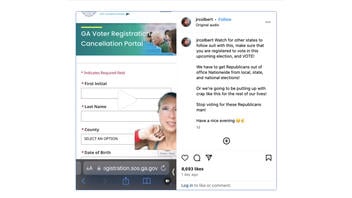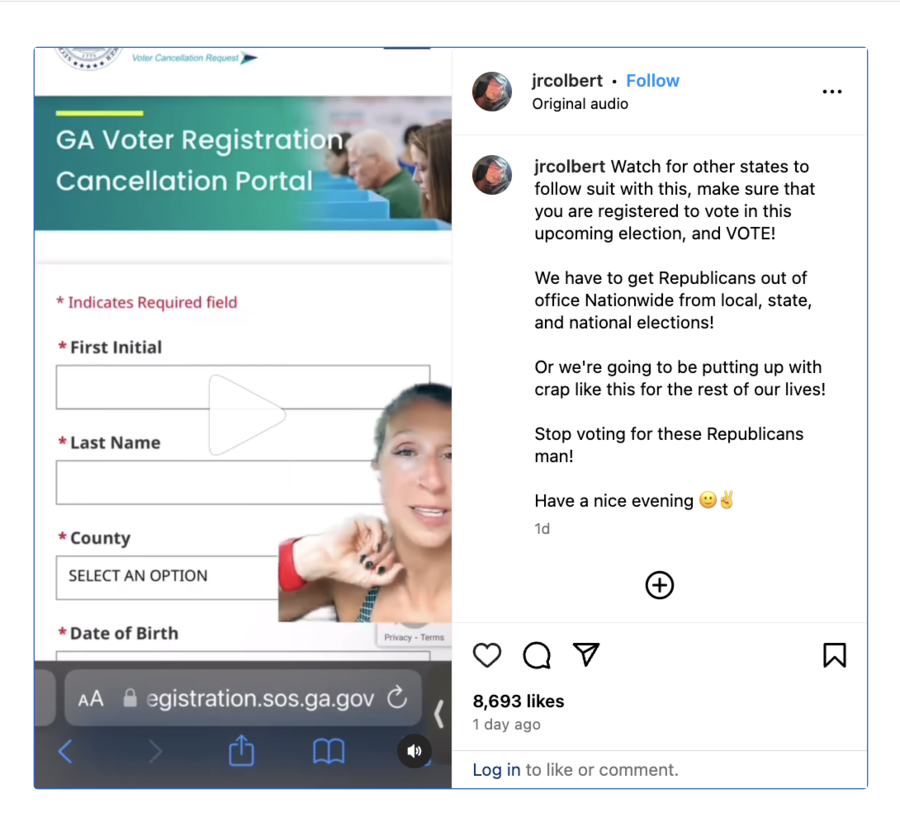
Does the Georgia Voter Registration Cancellation Portal automatically cancel voter registration based solely on entry of a voter's first initial, last name, county and date of birth? No, that's not true: These data points are only the first step in the process. A spokesperson for Georgia's Secretary of State, which oversees elections, told Lead Stories the system asks for more information. It also records a user's digital fingerprint to make misuse of the portal less likely.
The claim appeared in a video (archived here) posted on Instagram on July 29, 2024. The person who narrated the video said:
They created a website called the Georgia Voter Registration Cancellation Portal, and the only things you need to cancel your voter registration is your initial (not even your name), your last name, your county and your date of birth.
This is what the post looked like on Instagram at the time of the writing of this fact check:
(Source: Instagram screenshot taken on Wed Jul 3115:46:53 2024 UTC)
The woman went on to describe a hypothetical situation in which someone with the knowledge of a voter's first initial, last name, county of residence and date of birth could easily cancel that voter's registration without their approval.
The image in the video that appeared to be a screenshot of the portal was, in fact, a partial screenshot of one of its pages (archived here). However, the post on Instagram did not accurately summarize how this newly created service is designed to operate.
An official explanation of the portal in the News & Announcements section of the Georgia Secretary of State's website (archived here) specified that the portal requires voters' "secret personal identifying information (such as Drivers License/State ID # or Full/Partial SSN)" and for them to "indicate" they want to cancel their registration.
A spokesperson for Georgia's Secretary of State Brad Raffensperger, Mike Hassinger, told Lead Stories via email on July 31, 2024, that the claim in question "is inaccurate." Hassinger confirmed that more information is needed if voters want to remove themselves from the electoral roll and explained that what people submit through the portal is not the same as automatic cancellation:
That generates a request for cancellation to a local county elections official, who reviews the request and mails an acknowledgement of the request to the voter making it. If there is no response to the postcard from the voter, the local elections official cancels the registration.
If a voter's registration is cancelled in error, or without their knowledge, they can re-register using the Online Voter Registration system (OLVR). A voter whose registration has been cancelled who subsequently attempts to vote would be allowed to vote using a provisional ballot and dispute their cancellation.
The Associated Press reported (archived here) on July 30, 2024, that the portal's rollout on July 29, 2024, came with a glitch that exposed personal information needed for voter registration cancellation. While that glitch confirmed that "initial, last name, county and date of birth" were not the only data points collected to verify cancellation requests, the public disclosure of sensitive personal information added to concerns voiced by some local lawmakers about the potential misuse of the portal.
In a separate email on July 31, 2024, Hassinger said that the Secretary of State's office had fixed the glitch -- "believed to be the result of a scheduled software update," he said -- "within an hour."
He later elaborated that some voters had seen all the information "in their record" after beginning the cancellation process, but emphasized that "At no point was information from any voter, other than the one generating the cancellation request, visible or exposed."
The fact that the system gathers a lot of digital information to make voter cancellation requests traceable makes it easier to investigate potential abuses, he wrote.
The cancellation becomes a part of the voter's record and is kept on file by county elections officials. The cancellation part of the voter's record contains a record of the time, date, location and device used to make the cancellation request. Cancelling a voter's registration without their knowledge or consent is a felony and anyone attempting to cancel anyone's registration other than their own (or that of a deceased relative) will be prosecuted.
Lead Stories contacted some state lawmakers who had expressed concerns about the Voter Registration Cancellation Portal but did not receive an immediate response. If we receive a reply, this fact check will be updated as appropriate.
Other Lead Stories fact checks concerning claims related to the 2024 U.S. presidential election can be found here.

















